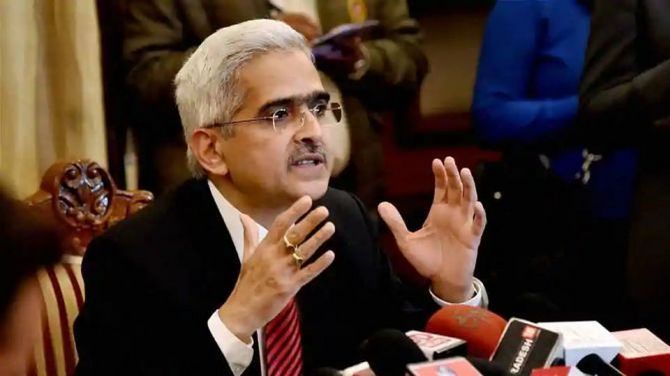Reserve Bank Governor Shaktikanta Das on Thursday said the central bank's asset purchases, aimed at mitigating COVID-19-related liquidity stress in the system, did not dilute its balance sheet or compromise on core principles of central banking.

In the wake of the pandemic, the RBI undertook several conventional and unconventional measures.
"Unlike many central banks, the RBI's asset purchases did not dilute its balance sheet and hence, did not compromise on core principles of central banking," Das said while addressing an event organised by the Bombay Chamber of Commerce.
These purchases were confined to risk-free sovereign (government) bonds including state government securities only, he said.
Other than conventional measures, RBI introduced long term repo operations (LTROs) and targeted long term repo operations (TLTROs) to augment the system as well as sector-specific liquidity to meet sectoral credit needs and alleviate stress, he said.
Special refinance facilities were provided to select All India Financial Institutions (AIFIs), while a special liquidity facility for mutual funds (SLF-MF) was introduced to ease redemption pressures, he added.
The governor further said over the last few months, forward guidance gained prominence in RBI's communication strategy for cooperative outcomes.
"Our commitment to ensure ample liquidity conditions supportive of recovery dispelled illiquidity fears and bolstered market sentiments.
“We will continue to support the recovery process through the provision of ample liquidity in the system, while maintaining financial stability," he said.
Speaking on the topic 'Creating New Opportunities for Growth', the governor said the manufacturing sector is spearheading the growth recovery as many contact-intensive services sub-sectors are severely affected by the pandemic.
He said the Emergency Credit Line Guarantee Scheme (ECLGS) and the Credit Guarantee Scheme for Subordinate Debt (CGSSD), along with various monetary and regulatory measures by the RBI including rate cuts, moratorium and restructuring, will not only help in ameliorating stress in the MSME sector but also open new opportunities.
Digital penetration in the country has scaled a new high, Das said, adding that time has come to leverage its applications while at the same time strengthen the digital infrastructure.
He also urged corporate sector to invest more to create scale and skill in the health sector, which has tremendous opportunities.
The governor said one of the policy areas which needs focus for providing a durable push to the country's exports and growth is Free Trade Agreements (FTAs) with key strategically important economies.
"The potential FTAs need to take cognisance of not only domestic strengths and global opportunities but also the emerging geo-political landscape in the post-pandemic period," he said, adding that the post-Brexit scenario offers a greater scope for having separate trade agreements with the UK and the European Union.
Das further said the country is on the cusp of a turnaround in fortunes.
"In contrast to the rest of the world, the caseload of COVID-19 in India has declined and it is crucial for us to consolidate this decline and capitalise on the success that has been hard-earned," he emphasised.
He also said with the infection caseload in some parts of the country again creeping up, one needs to stay vigilant and steadfast.
Photograph: PTI Photo











 © 2025
© 2025